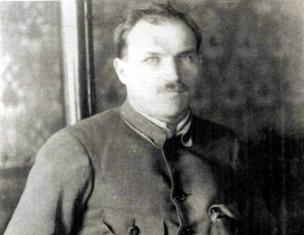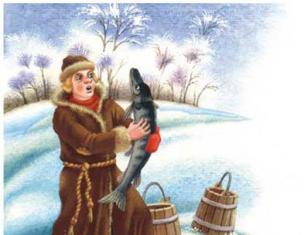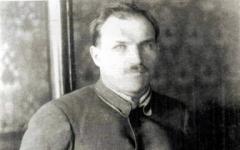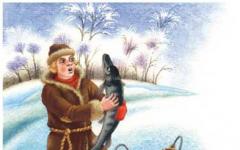Brief retelling of “Horse with pink mane"will remind you of what Astafiev wrote in his autobiographical story.
Retelling of the story “The Horse with the Pink Mane”
The story is narrated from Vitka’s perspective. The author recalls an incident from his life that happened when he was still a boy. After the death of his parents, he lived with his grandmother in the village. One day, his grandmother sent him to the forest to pick strawberries, promising that if he picked a full bunch of berries, she would bring him from the city a gingerbread in the shape of a horse with a pink mane. All the boys in the village dreamed of such a gingerbread, and of course, the author decided not to return from the forest without berries.
The father of the children with whom the grandmother sent the boy to pick berries, neighbor Levontii, worked in logging. About once every fifteen days, “Levonty received money, and then in the neighboring house, where there were only children and nothing else, a feast began,” and Levonty’s wife ran around the village and paid off debts. On such days, Vitka made his way to his neighbors by all means. Grandma wouldn't let me in. “There’s no point in eating these proletarians,” she said. Levontius willingly accepted Vitka and pitied him as an orphan. The money the neighbor earned ran out quickly, and Vasyon’s aunt again ran around the village, borrowing money.
When the hero had already picked several glasses of strawberries, a fight broke out between Levontius’s children - the eldest son noticed that the others were not picking strawberries, but eating them. During the fight, they scattered the strawberries that they had already collected, and then decided to go to the river. And then they noticed that the hero still had strawberries, and immediately persuaded him to eat all the berries, which he did. The boy felt sorry for the berries, but pretending to be desperate, he rushed with the others to the river.
The guys spent the whole day walking. We returned home in the evening. To prevent the grandmother from scolding the main character, the guys advised him to fill the bowl with grass and sprinkle berries on top. The boy did just that. Grandmother was very happy, not noticing the deception and even decided not to pour in the berries. To prevent Sanka from telling Katerina Petrovna about what happened, the narrator had to steal several rolls of bread from the pantry for him.
The boy regretted that his grandfather was on a farm “about five kilometers from the village, at the mouth of the Mana River,” so that he could escape to him. Grandfather never swore and allowed his grandson to walk until late.
Vitka wanted to wait until morning and tell his grandmother the truth. But I woke up when my grandmother had already left for the market. He went fishing with the Levontiev boys. Sanka caught some fish and lit a fire. Without waiting for the fish to finish cooking, the Levontiev boys ate it half-raw, without salt and without bread. After swimming in the river, everyone fell into the grass.
Suddenly, a boat appeared from behind the cape, in which Ekaterina Petrovna was sitting. The boy immediately started running, although his grandmother shouted menacingly after him. The narrator stayed at the house until dark cousin. His aunt brought him home. Hiding in the closet among the rugs, the boy hoped that if he thought well of his grandmother, “she would guess about it and forgive everything.”
The main character began to remember his mother. She also took people to the city to sell berries. One day their boat capsized and the mother drowned. Having learned about the death of her daughter, the grandmother stayed on the shore for six days, “hoping to appease the river.” She was “almost dragged home,” and after that she was sad for the deceased for a long time.
Vitka woke up from the first rays of the sun. He was wearing his grandfather's sheepskin coat. The boy was happy - his grandfather had arrived. All morning the grandmother told everyone who visited them how she sold berries to a “cultured lady in a hat” and what dirty tricks her grandson had committed.
Having gone into the pantry to get the reins, the grandfather pushed his grandson into the kitchen so that he would apologize. Crying, the boy asked his grandmother for forgiveness. The woman “still irreconcilably, but without the storm” called him to eat. Listening to his grandmother’s words about “what a bottomless abyss his “cheating” had plunged him into,” the boy burst into tears again. Having finished scolding her grandson, the woman nevertheless placed a gingerbread horse with a pink mane in front of him, telling him to never deceive her again.
“How many years have passed since then! My grandfather is no longer alive, my grandmother is no longer alive, and my life is coming to an end, but I still can’t forget my grandmother’s gingerbread - that marvelous horse with a pink mane.”
A brief retelling of the story “The Horse with the Pink Mane” for reader's diary It's better to cut it down a bit. Here's an example:
The village boy Vitka dreams of a gingerbread in the shape of a horse with a pink mane. He goes to pick strawberries, because his grandmother promises him a gingerbread horse for this. The boy could not restrain himself and ate the entire basket of berries that he had picked. Then he cheated and put the grass in a basket, picked up a few berries and covered the grass with them. His conscience tormented him all the time and he wanted to tell his grandmother, but did not have time.
The grandmother went to the market in the morning, and her grandson was tormented by his conscience and fear of what would happen when the deception was revealed. Out of shame, the boy did not want to go home. Meanwhile, the grandmother had already told about her grandson’s fraud. When he arrived, the grandmother was upset, scolded the boy, but still bought him a gingerbread horse - a horse with a pink mane.
Year of writing: 1963
Genre of the work: story
Main characters: Grandmother and her grandson Vitya
Astafiev is a master of instructive stories for youth and children, having read summary story “A Horse with a Pink Mane” for a reader’s diary, the young reader will be able to see this for himself.
Plot
The orphan Vitya was raised by his grandmother. He dreamed of a white gingerbread in the shape of a horse. The grandmother asked her grandson to pick a box of strawberries in the forest so that with the money received from selling the berries, she could buy her grandson a gingerbread.
The boy was ready to complete the task, but started playing with the neighboring children. When it was time to go home, the boy picked a full box of grass and put berries on top. The grandmother did not understand the deception and took the box away to sell.
The next morning the old lady had to deal with the customer. Vitya was scolded. He felt very ashamed of his deception. He agreed to any punishment and completely repented. After dinner, the loving grandmother gave her grandson the long-awaited gingerbread. The boy remembered this lesson for the rest of his life.
Conclusion (my opinion)
Bring up moral qualities in children it is necessary from an early age. Cheating will not lead to anything good.
Victor Astafiev's story “The Horse with a Pink Mane” is autobiographical. The author wrote about an episode of his childhood, which he still remembers, how, in order to get a gingerbread in the shape of a horse with a pink mane, he deceived his grandmother, the neighbor boy Sanka suggested it to him. The story is written from the perspective of the boy Vitya.
Summary of the story “The Horse with the Pink Mane”
Vitya with the Levontiev children goes to the ridge to buy strawberries. Grandmother Katerina Petrovna promised the boy that she would sell his strawberry cake and bring him a gingerbread in the shape of a horse with a pink mane. The boy collected almost more than half of the tuesk. But neighbor Sanka provoked him to pour all the berries onto the grass, and Levontiev’s “horde” ate everything.
Then the guys played around the river all day, and when the day was setting, they had nothing to return home with. The cunning Sanka taught Vitya to push some grass into the jar and sprinkle it with a handful of berries. Fearing his grandmother, he did just that. Although he knew that retribution was inevitable.
Grandma took berries to the city market, suspecting nothing, the deception was revealed only during the sale. When Katerina Petrovna sailed from the city, the next day she scolded her grandson in the form of telling everyone she met what a swindler he was and what he would grow out of.
Vitya already repented, fortunately, on that day his grandfather returned from the farm, who felt sorry for his grandson, he told him that there was nothing to do, he had to ask his grandmother for forgiveness. The grandmother forgave, and saved the gingerbread for her grandson.
A brief retelling of the story “The Horse with the Pink Mane”
Plan brief retelling"Horse with a pink mane":

Let us now consider each point in more detail..
The story begins with the fact that the grandmother came from the neighbors; their guys were going to go to the ridge to buy strawberries. And she told her grandson to go with them, in return she would bring him gingerbread. This is the dream of all village boys; its owner is worthy of respect and honor.
Next, the author talks about neighbors: Uncle Levontia, his wife Vasena and a bunch of their children. Uncle Levontius was engaged in logging. On the day of payday, they had a huge feast in their house, and Uncle Levontius’s wife Vasenya went to pay off debts, including to grandmother Katerina, and with a small amount of debt of 7 or 10 rubles.” For Vitya, it was the goal of his life to sneak into Uncle Levontius’s house on the day of his salary, to listen to the song about “little licker.” Levontius pitied Katerina Petrovna’s grandson, like an orphan, and always sat him down at the table. The feast always ended with Levontius's brawl, and his wife again began to go borrow from neighbors until her next payday.
Vitya went with the Levontiev boys to pick strawberries. On the way to the ridge, the kids play around and do mischief, for example, they wandered into someone’s garden, and there was nothing there except onions, so they picked them too. On the ridge, the Levontievsky guys started a fight and ate all the strawberries that they had picked. Sanka was the most harmful and evil instigator, he called Vitya a greedy person and took it “weakly”, he poured out all his strawberries, which the Levontievskys instantly swept away.
The rest of the day the children ran by the river, and in the evening the same Sanka persuaded Vitya to deceive his grandmother and push the herbs into the basket and sprinkle the berries on top. So he did, and the grandmother did not notice anything, she even praised him. Then the boy boasted to Sanka about what he had done, and he said that he would tell his grandmother everything, and Vitya stole rolls from his grandmother for him.
At night, the boy could not sleep for a long time, he already terribly repented of what he had done and wanted to confess everything to his grandmother himself, but did not disturb her sleep, and early in the morning she sailed in a boat to the city to sell berries at the market.
 The next day, tormented by a heavy premonition about what will happen when the grandmother returns from the city, because the deception will still be revealed, Vitya goes fishing with Sanka and his guys. Sanka again offers Vitka a “plan” - to run away from home and hide. Vitya has already protested to this.
The next day, tormented by a heavy premonition about what will happen when the grandmother returns from the city, because the deception will still be revealed, Vitya goes fishing with Sanka and his guys. Sanka again offers Vitka a “plan” - to run away from home and hide. Vitya has already protested to this.
In the evening, the granny returned from the city and, seeing the boat, the boy ran away. He thought of spending the night with his cousin Kesha, but his mother, Aunt Fenya, fed him, questioned him and took him home herself.
The boy spent that night in the closet in the hallway, there was a bed made of rugs. In the morning he saw that he was covered with his grandfather's sheepskin coat, which he was very happy about, since his grandfather always stood up for his grandson. This time too, the grandmother was seriously angry, because it was only at the market that her grandson’s fraud was discovered. She told everyone whom Katerina Petrovna met that day about her grandson’s scam.
The grandmother forgave her grandson after he asked her for forgiveness, but still brought him the gingerbread with the horse.
What is the story “The Horse with the Pink Mane” about?
The content of the story is very instructive. Through him, the reader sees how a little boy is deeply worried about the deception into which he is drawn in by a neighbor boy from a dysfunctional family, who tries to dominate everyone with his authority. Vitya understands how much his grandmother, who often scolds him, despite his business, loves him immensely. That is why she brought gingerbread to her grandson, despite his deception. Because she understood where “legs grow” from, the school of the neighbor’s children.
 The story raises three moral issues:
The story raises three moral issues:
- Honesty;
- Debt;
- Kindness.
Another lesson the reader can learn from the story is not to be afraid to ask for forgiveness and always tell the truth, even if it is very embarrassing and difficult.
Main characters
- Vitya- the story is told on his behalf, this boy was left without parents, the grandson of Katerina Petrovna.
- Katerina Petrovna- his grandmother.
- Sanka- the son of a neighbor named Levontius, very mischievous.
Summary of the story
Vitya tells a story from his childhood. He lives in a village on the banks of the Yenisei. His mother drowned, so the boy is being raised by his grandparents. One day Katerina Petrovna asks her grandson to go with the boys to the forest and pick strawberries, and then she was going to sell them. With the money he earns, he promises to present him with a gingerbread “horse with a pink mane,” which all the children in the village so wanted to receive. The neighbor's children lived poorly, their father Levontius loved to party, but did not want to work. Therefore, once every two weeks they had a holiday in the house, and after that his wife only borrowed money. Our hero goes into the forest and picks berries. During the collection, Levontius's children ate more and more berries and ultimately did not collect anything. The oldest of them, Sanka, saw that Vitya had berries, teased him and called him greedy. Vitya gets angry at this and, in order to convince everyone that he is wrong, throws all the strawberries out of the basket. The guys immediately swallow it all. Vitya is standing without a harvest, which means that now he won’t see any gingerbread. The boy listens to Sanka's advice and decides to cheat - he pours grass into the basket, lightly covering it with a thin layer of strawberries. The grandmother did not notice what was in the basket and took it away the next morning to sell it. The fact that there were few berries in the basket was noticed by Katerina Petrovna only in the city. She comes back very angry. Vitya knows that he will be scolded and hides all day. Finally, late at night, he has to go home. To his surprise, grandma doesn't say anything.
Writing stories for children is not as easy as it seems at first glance. Victor Astafiev was able to compose a truly interesting and instructive story, after reading which a child will learn a lot useful information. The story was called “The Horse with the Pink Mane.” Reviews about the product are positive character, and to be convinced of this, it is enough to read its summary.
Start
The protagonist’s grandmother instructed him to go to the ridge along with the neighbor’s children to pick strawberries to sell. As a reward for this, she promised the boy to buy a gingerbread in the shape of a horse with a mane, hooves and tail covered in pink icing. The family of the hero's comrades lived poorly. My father worked in logging and received a salary once every two weeks. When this happened, they threw a feast to celebrate, and the children’s mother distributed the debts. However, the money ran out quickly, and before receiving the next reward for their work, they again borrowed from their neighbors. They lived unprosperously: the frail fence was almost immediately used for firewood, and they even washed at their neighbors’. If you read any review of “The Horse with the Pink Mane,” you will find out that readers feel pity for these children.
Berry picking
Together with his comrades, the hero goes for the treasured berries in order to earn money for the desired gingerbread. He managed to pick more than one glass of strawberries when the other children started a fight: the eldest of them discovered that the others did not pick the berries, but simply eat them. During the brawl, everything they managed to collect was scattered on the ground, trampled or eaten. The children were not upset and decided to go swimming. One of them noticed that the berries collected by the hero were intact. He encouraged him to eat them “weakly”, and all the friends went to the river together. Almost every person scolds him for this when writing his review. “The Horse with the Pink Mane” doesn’t end there. The main character remembers that he did not collect the required berries until late in the evening. My comrades advised me to collect a bunch of grass and stones, and sprinkle berries on top. So the boy returned home.

Revealing the Deception
The grandmother praised the boy for a long time; she did not pour in the berries, deciding to take them away as they were. All night his conscience tormented him, and in the morning main character decided to confess to the crime. But he was late; my grandmother had already left for the city. The boy wanted to hide somewhere, but there was no secluded place, so he went fishing with a friend. A few hours later, he saw his grandmother returning on a boat; she shook her fist at the hero, making it clear that the deception had been revealed. He was able to return home only in the evening and immediately hid in the closet, where he had prepared a “temporary” bed in advance. In the morning, the grandfather came to the boy and told him to apologize for his action. After grumbling, the grandmother sat her grandson down to breakfast, while continuing to lament the deception. What she did next is praised by almost every person writing a review. “The Horse with a Pink Mane” ends with an unexpected gift for the hero. Grandma still brought him the treasured gingerbread.

Readers' opinion about the story, review
“The Horse with a Pink Mane” delights readers. The story is very instructive, it is useful not only for children, but also for adults. The work teaches the most important thing - any deception will always be exposed, and - the most terrible punishment. The wise grandmother did not beat the guilty child, did not put him in a corner, but only left him alone with himself, allowing him to fully understand the consequences of his action. This is exactly what almost every person who writes their review notes. “The Horse with a Pink Mane” is exactly the work that children should read.








